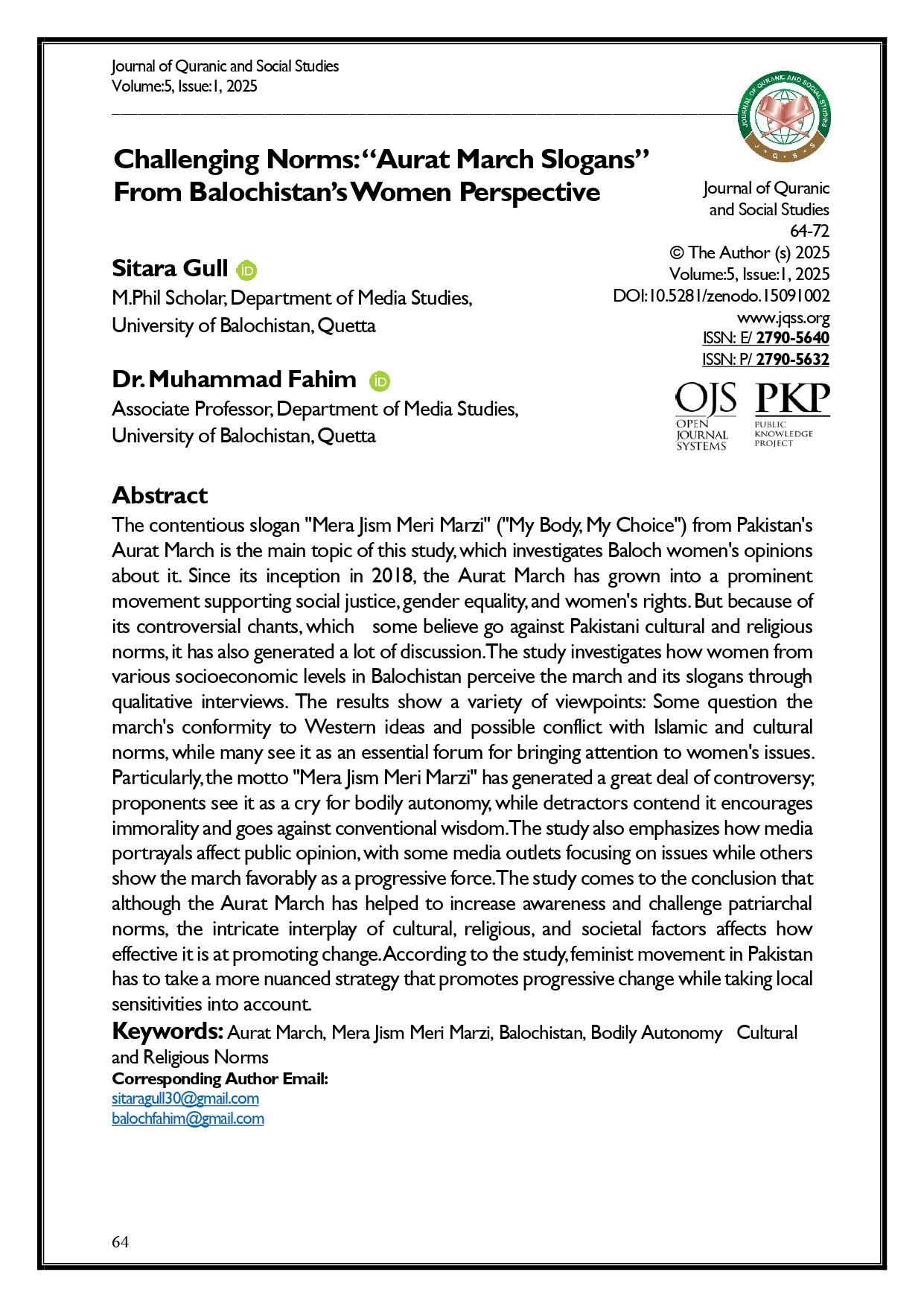Challenging Norms: “Aurat March Slogans” From Balochistan’s Women Perspective
DOI:
https://doi.org/10.5281/zenodo.15091002Abstract
The contentious slogan "Mera Jism Meri Marzi" ("My Body, My Choice") from Pakistan's Aurat March is the main topic of this study, which investigates Baloch women's opinions about it. Since its inception in 2018, the Aurat March has grown into a prominent movement supporting social justice, gender equality, and women's rights. But because of its controversial chants, which some believe go against Pakistani cultural and religious norms, it has also generated a lot of discussion. The study investigates how women from various socioeconomic levels in Balochistan perceive the march and its slogans through qualitative interviews. The results show a variety of viewpoints: Some question the march's conformity to Western ideas and possible conflict with Islamic and cultural norms, while many see it as an essential forum for bringing attention to women's issues. Particularly, the motto "Mera Jism Meri Marzi" has generated a great deal of controversy; proponents see it as a cry for bodily autonomy, while detractors contend it encourages immorality and goes against conventional wisdom. The study also emphasizes how media portrayals affect public opinion, with some media outlets focusing on issues while others show the march favorably as a progressive force. The study comes to the conclusion that although the Aurat March has helped to increase awareness and challenge patriarchal norms, the intricate interplay of cultural, religious, and societal factors affects how effective it is at promoting change. According to the study, feminist movement in Pakistan has to take a more nuanced strategy that promotes progressive change while taking local sensitivities into account.
Downloads
References
Tauqir, T. & Akram, K. (2020).Linguistic analysis of language usedin placards observed during Aurat March 2020. Competitive Linguistic Research Journal (CLRJ)2020, 2(2), 1-18.
IshratNaureen, Ihsan Ali, Rehman Mustafa Cheema, QuynhDzung Dang, & SundarHuma. (2023). Representation of Anti-Islamic perspective: A Critical Discourse Analysis of Aurat March (2019-2020) in Pakistan. Elementary Education Online, 19(3), 2426–2435
Baig, F. Z., Aslam, M. Z., Akram, N., Fatima, K., Malik, A., & Iqbal, Z. (2020). Role of media in representation of sociocultural ideologies in Aurat March (2019–2020): A multimodal discourse analysis. International Journal of English Linguistics, 10(2), 414-427.
Zehra, N. (2024). A Litany for Survival: Exploring Activism, Feminism, and Collective Identity in Women's Movements in Pakistan (Master's thesis, Dartmouth College).
Khan, A. (2021). Pakistan: A Rising Women’s Movement Confronts a New Backlash: To build justice and peace in a nation vital to security, feminism needs a religious message. United States Institute of Peace, 17.

Downloads
Published
How to Cite
Issue
Section
License
Copyright (c) 2025 Author

This work is licensed under a Creative Commons Attribution-NonCommercial 4.0 International License.



























